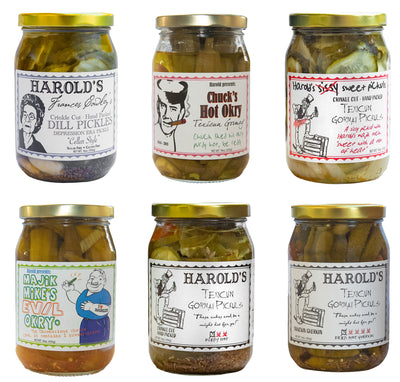Sweet and Spicy Cucumber Pickles
Taste sensation that marries the crisp freshness of cucumbers with a tantalizing blend of sweetness and heat, look no further. These pickles are a culinary delight that will awaken your taste buds and leave you craving more. In this culinary journey, we'll uncover the secrets to creating these mouthwatering pickles from scratch. Ensuring that every bite is a harmonious explosion of flavours.
The Beauty of Homemade Pickles
Discover the enchantment of homemade pickles, a journey into the world of flavors, creativity, and tradition. Crafted with love and care in your kitchen, these pickles are more than just condiments. They are edible works of art. From the vibrant colors to the intricate blend of spices, every jar tells a unique story of taste and culture. The process is a labor of love, transforming fresh ingredients into tangy delights that dance on your palate. Beyond the tantalizing flavors, homemade pickles embody the essence of sustainability and craftsmanship, allowing you to savor seasonal abundance year-round. So, step into the world of Homemade Pickles and unlock a world where culinary passion meets the joy of creation.
The Sweet and Spicy Revelation
Crafted with meticulous care and a blend of contrasting elements, Sweet and Spicy pickles cucumber can transform ordinary moments into extraordinary experiences. Their vibrant colors and bold flavors make them a treat for the taste buds and a feast for the eyes. The delicate sweetness beautifully counterbalances the fiery spiciness, creating a harmonious symphony long after the last bite.
But the allure of these pickles doesn't stop at their remarkable taste. It extends to their versatility, as they seamlessly adapt to various culinary roles. Elevate charcuterie board with their vibrant presence, introduce a new layer of excitement to salads, or enjoy them as a standalone snack that always impresses. The Sweet and Spicy Cucumber Pickles can turn an ordinary dish into a masterpiece, a simple moment, into a celebration.

What's the difference between spicy pickles and sweet pickles?
While sharing a common origin, spicy and sweet pickles diverge in flavor profiles and preparation methods. Traditional pickles, often called dill pickles, are made through cucumbers and brine fermentation. This method involves allowing the cucumbers to sit in a mixture of water, salt, and spices, encouraging the growth of beneficial bacteria that give rise to their tangy, sour taste. On the other hand, sweet pickles are crafted by immersing cucumbers in a solution of vinegar and sugar, often accompanied by a blend of spices for added complexity. This infusion of sweetness results in a distinctly different flavor, with a balanced combination of tartness and sugary notes. While both types of pickles provide a satisfying crunch and a burst of flavor, the difference lies in their taste profile, making them versatile ingredients for various culinary creations.
What are the two categories of pickles?
Pickles are traditionally categorized into two main types: fermented and fresh-pack. Fermented pickles are created through lacto-fermentation, where cucumbers are submerged in a brine solution and allowed to ferment over time naturally. This results in fermented pickles' tangy flavor and unique texture, such as dill pickles and sauerkraut. On the other hand, fresh-pack pickles, also known as quick pickles, are made by immersing cucumbers in a vinegar-based solution with various seasonings and spices. These pickles undergo a shorter soaking period and are often ready to eat within a few hours or days. This category includes popular varieties like bread and butter pickles and sweet pickles. The two categories offer distinct taste profiles and preservation methods, allowing pickle enthusiasts to enjoy various flavors and textures.
Which cucumber is best for pickles?
Selecting the ideal cucumber for pickling is a nuanced decision around texture, flavor, and size. The most commonly preferred cucumbers for pickling are the smaller varieties, like Kirby cucumbers, also known as pickling cucumbers. These cucumbers boast a firm and crisp texture, crucial to achieving that classic, satisfying pickle crunch. Their smaller size allows them to soak up the brine and spices more effectively, resulting in well-infused and flavorful pickles. Furthermore, their thin skin minimizes the need for peeling, streamlining the pickling process. While other cucumber types, like English cucumbers, can also be used, their higher water content and thicker skin might impact the final texture and flavor of the pickles. Ultimately, when it comes to pickling cucumbers, the choice of cucumber largely influences the overall quality and taste of the finished product.

How To Make Sweet and Spicy Cucumber Pickles?
Prep the Cucumbers: Wash and slice the cucumbers and red onion thinly. If you prefer less crunchy pickles, lightly salt the cucumber slices and let them sit for about 30 minutes before rinsing and draining.
Create the Brine: In a saucepan, combine the white vinegar, water, granulated sugar, salt, black peppercorns, red pepper flakes, mustard seeds, turmeric powder, and celery seeds (if using). Bring the mixture to a boil, stirring until the sugar and salt dissolve.
Pack the Jars: Place a few sprigs of fresh dill at the bottom of each sterilized glass jar. Pack the cucumber and onion slices into the jars, layering them with minced garlic.
Pour the Brine: Carefully pour the hot brine over the cucumber and onion mixture in the jars, ensuring the liquid covers the vegetables thoroughly.
Seal and Cool: Place the lids on the jars and let them cool to room temperature on the counter.
Refrigerate and Infuse: Once cooled, transfer the jars to the refrigerator. Allow the flavors to meld and develop over 24 to 48 hours before diving into your pickles.
What kind of vinegar is best?
The question of "What kind of vinegar is best?" often comes down to the intended use and personal preference. Distilled white vinegar is a versatile option for cleaning, pickling, and preserving due to its neutral flavor. Apple cider vinegar, known for its potential health benefits, imparts a mild fruitiness and works well in dressings and marinades. Balsamic vinegar adds depth to salads and dishes with its rich and complex flavor profile. Red wine vinegar offers a robust taste that complements hearty recipes, while rice vinegar is a staple in Asian cuisine, contributing a delicate sweetness. Ultimately, the best vinegar choice depends on the culinary context and the flavors you wish to enhance or balance.
Why are the cucumbers and onions salted?
Cucumbers and onions are often salted for both practical and flavor-enhancing reasons. When cucumbers are salted, it helps to draw out excess moisture from their flesh, which results in crisper pickles with a better texture. This process, known as "disgorging," is essential for achieving the desired crunchiness of pickled cucumbers. Additionally, salting cucumbers can remove any bitterness that might be present in the peel or seeds. Onions, when salted, undergo a process of osmosis, where the salt draws out moisture from the onions. This reduces the harshness of raw onions and improves their overall flavor and texture, making them milder and more palatable for pickling. Salting cucumbers and onions before pickling is a time-tested technique contributing to the final pickled product's quality, taste, and texture.

Why do sweet pickles taste so good?
Sweet pickles delight our taste buds with unique flavors that evoke a harmonious symphony of sweetness, tanginess, and subtle spices. The allure of sweet pickles lies in the intricate balance they strike between the cucumbers' natural sweetness and the pickling solution's bracing acidity. As cucumbers undergo pickling, they absorb the essence of the flavorful brine, infusing them with a medley of tastes that awaken our senses. The interplay of sugar, vinegar, and spices transforms the humble cucumber into a delectable treat that lingers on the palate, offering a delightful contrast of flavors with every bite.
How long will the pickles last?
The longevity of pickles largely depends on the preservation method employed. Properly canned and sealed pickles, such as those prepared using the water bath canning method, can last anywhere from 1 to 2 years when stored in a cool, dark place. Refrigerator pickles, made by immersing cucumbers in a vinegar solution and refrigerating them, have a shorter shelf life of around 1 to 3 months due to their more limited preservation process.
Conclusion
Making your own sweet and spicy cucumber pickles is a rewarding endeavor that promises a taste sensation. With just a handful of ingredients and patience, you can create a jar of pickles bursting with flavors that dance between sweet and spicy. So, roll up your sleeves, gather your ingredients, and embark on a pickle-making journey that will tantalize your taste buds and elevate your culinary skills. Your homemade pickles might become the star of your next gathering or a cherished solo indulgence either way, prepare for a flavor-packed adventure.


